Allgemein
DARWIN
AND DARWINISM
John H. Wahlert - John_Wahlert@baruch.cuny.edu
The subject--Darwin and Darwinism--has broad and deep effects
in the several disciplines of the arts and humanities and in
contemporary culture, and it presents an opportunity to
improve the science literacy of future business people,
educators, and citizens.
Faculty:
- Participants
in the Darwin and
Darwinism Seminar with links to comments on
curricular implementation and to articles in
fields of expertise
- Faculty
Seminar topics,
speakers, and suggested readings in arts,
sciences, and business disciplines
- Resource
persons available to
assist students in research on Darwin and
Darwinism
Darwin
biography:
CUNY
Faculty Development Colloquium:
Courses
Offered:
Student
Work:
|
http://darwin.baruch.cuny.edu/index.html
The
C. Warren Irvin, Jr., Collection of Charles Darwin and
Darwiniana
text by Roger Mortimer, hypertext by Jason A. Pierce
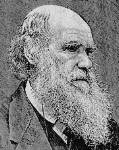 originally
exhibited May-June 1992 originally
exhibited May-June 1992
Thomas Cooper Library, University of South Carolina
The C. Warren
Irvin Jr. Collection has been formed carefully to reflect
Darwin's writings and interests and to place them in the
context of the work of his immediate predecessors, his
grandfather Erasmus Darwin, Thomas Robert Malthus, Jean
Baptiste Lamarck and Sir Charles Lyell; and of his principal
colleagues and followers, Alfred Russel Wallace (who
formulated the theory of evolution by natural selection
simultaneously with and independently of Darwin), Thomas Henry
Huxley, and Darwin's cousin Francis Galton, founder of the
study of eugenics.
http://www.sc.edu/library/spcoll/nathist/darwin/darwin.html
URBANOWICZ
on DARWIN
Charles F. Urbanowicz - curbanowicz@oavax.csuchico.edu
The paper deals with some of the scientific research of
Charles R. Darwin (1809-1882), specifically his monumental
1859 publication entitled On The Origin of Species by Means
of Natural Selection or the Preservation of Favoured Races in
the Struggle for Life. This paper also points out the
"human" side of this most noted of human beings and
Darwin's ideas are presented in the context of his times.
Today, Darwin's theory of "natural selection" is
hopefully well known but how did the culture of his times
influence his ideas and the development and acceptance of his
theory? What happened before Darwin published Origin
and what came after his numerous other publications? Charles
Darwin was an extremely important individual for a variety of
reasons: the data he collected, the experiments he conducted,
and the theories he proposed influenced a variety of
disciplines, from anthropology to zoology as well as ecology,
geology, and the general social sciences. His influence
continues to be condemned, supported, and debated after almost
150 years.
http://www.csuchico.edu/~curban/Darwin/DarwinSem-S95.html
CHARLES
DARWIN -
The Origins of Doubt and the Rebirth of Praise
Charles P. Henderson, Jr.
One cannot begin to fathom the dilemma of western culture
without reflecting upon Charles
Darwin and The
Origin of Species. Obviously,
Darwin's theories about the evolution of life on this planet
stand at the very center of the controversy between science
and religion. We are reminded of this by the increasing
efforts of creationists
to gain equal time for the Bible in the
public schools of America, but these rearguard efforts to turn
back the pages of history and re-enact the Scopes
trial are of far less
significance than the continuing cold war between the world's
leading scientists and theologians. For this is a controversy
being conducted not in the rural countryside of Arkansas and
Nebraska but in the leading universities and at the most
advanced frontiers of human thought.
 In
Darwin's age and in reaction against the stranglehold which the
doctrine of special creation had upon the human imagination, it
may have been necessary to construct a secular science, free of
all appeals to God. In the closing moments of the twentieth century,
however, when nature is not generally taken to be a window looking
out upon divinity, it is an opportune moment to recapture something
of the grandeur in this view of life. Nature is at once a sequence
of events ascertained by science and an act of God. It may be time,
in other words, to repair the breach that has opened up between
the Darwins and the Paleys, to acknowledge that they were never
that far apart, and to continue searching for a conception of the
origin, end, and purpose of life that invites not only our continuing
study but also our praise. In
Darwin's age and in reaction against the stranglehold which the
doctrine of special creation had upon the human imagination, it
may have been necessary to construct a secular science, free of
all appeals to God. In the closing moments of the twentieth century,
however, when nature is not generally taken to be a window looking
out upon divinity, it is an opportune moment to recapture something
of the grandeur in this view of life. Nature is at once a sequence
of events ascertained by science and an act of God. It may be time,
in other words, to repair the breach that has opened up between
the Darwins and the Paleys, to acknowledge that they were never
that far apart, and to continue searching for a conception of the
origin, end, and purpose of life that invites not only our continuing
study but also our praise.
http://www.crosscurrents.org/darwin.htm
Charles
Darwin - The Truth?
Andrew J. Bradbury - bradburyac@mistral.co.uk
This is the
story of not one but four men - Charles Darwin, Edward Blyth,
Charles Lyell and Alfred Wallace. Each of them played a
crucial role in the development and eventual publication of The
Origin, but maybe not the ones we are familiar with.
Appendices -
The full text of Blyth's papers from 1835-37
http://www3.mistral.co.uk/bradburyac/dar0.html
|
Biographie
Charles
Darwin: Encyclopädia Britannica | article page
b. Feb. 12, 1809, The Mount, Shrewsbury, Shropshire, Eng.
d. April 19, 1882, Down House, Downe, Kent.
in full CHARLES ROBERT DARWIN English naturalist
renowned for his documentation of evolution and for his theory
of its operation, known as Darwinism. His evolutionary theories,
propounded chiefly in two works--On the Origin of Species by
Means of Natural Selection (1859) and The Descent of Man,
and Selection in Relation to Sex (1871)--have had a profound
influence on subsequent scientific thought.
http://www.britannica.com/bcom/eb/article/0/0,5716,117775+1+109642,00.html
Charles
Darwin - British Naturalist
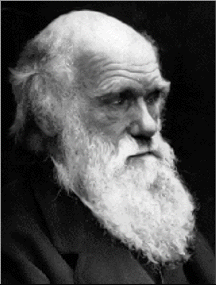 Charles
Darwin was
born on February 12, 1809 in Shrewsbury, England. He was the British
naturalist who became famous for his theories of evolution and natural
selection. Like several scientists before him, Darwin believed all
the life on earth evolved (developed gradually) over millions of
years from a few common ancestors. Charles
Darwin was
born on February 12, 1809 in Shrewsbury, England. He was the British
naturalist who became famous for his theories of evolution and natural
selection. Like several scientists before him, Darwin believed all
the life on earth evolved (developed gradually) over millions of
years from a few common ancestors.
Darwin's theory
of evolutionary selection holds that variation within species
occurs randomly and that the survival or extinction of each
organism is determined by that organism's ability to adapt to
its environment. He set these theories forth in his book called,
"On the Origin of the Species by Means of Natural Selection,
or the Preservation of Favoured Races in the Struggle for
Life" (1859) or "The Origin of the Species" for
short. After publication of Origin of Species, Darwin continued
to write on botany, geology, and zoology until his death in
1882. He is buried in Westminster Abbey.
http://www2.lucidcafe.com/lucidcafe/library/96feb/darwin.html
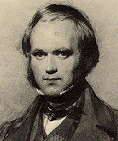 Charles
Darwin: Time Line Charles
Darwin: Time Line
http://honors.ccsu.ctstateu.edu/Honors/EText/Darwin/DarwinTimeLine.html
Charles
Darwin, 1809-1882
Steven Kreis - stevek@pagesz.net
Charles Darwin,
the discoverer of natural selection, was born at Shrewsbury.
After five years at Shrewsbury grammar school, Darwin studied
medicine at Edinburgh University (1825-27) and then, with a
view to the Church, entered Christ's College, Cambridge
(1828). It was at Cambridge that his biological studies began
in earnest. came acquainted with Professor Henslow who
encouraged his interest in zoology and geology. In 1831 Darwin
received his B.A. and shortly afterwards was recommended by
Henslow as naturalist aboard the H. M. S. Beagle,
then about to begin a scientific survey of South American
waters. By 1846 he had published several works on the
geological and zoological discoveries of his voyage -- works
that placed him in the front rank of mid-19th century
scientists.
He formed a
friendship with Sir Charles Lyell (1797-1875), was secretary of
the Geological Society (1838-41) and in 1839 was elected a
Fellow of the Royal Society. From 1842 he spent his time in Kent
as a country gentleman among his gardens and conservatories. At
Kent he devoted his attention to the great work of his life --
the problem of the origin of species. Darwin then set to work on
The Origin of Species by means of Natural Selection,
which was published in November 1859. He then began to write a
number of supplemental works including: The Fertilisation of
Orchids (1862), The Variation of Plants and Animals
under Domestication (1867), and The Descent of Man
(1871). In this latter work, Darwin suggested that man descended
from a hairy quadrumanous animal belonging to to the great
anthropoid group, and related to the progenitors of the
orangutan, chimpanzee, and gorilla.
A
prolific author, Darwin also composed the following works: The
Expression of the Emotions of man and Animals (1873), Insectivorous
Plants (1875), Climbing Plants (1875), The
Effects of Cross and Self Fertilisation in the Vegetable
Kingdom (1876), Different Forms of Flowers in Plants
of the same Species (1877), The Power of Movement in
Plants (1880), and The Formation of Vegetable Mould
through the action of Worms (1881).
Darwin
will be remembered as the leader of evolutionary biology.
Although he was not the originator of the theory of evolution,
nor even the first to apply the notion of descent to plants
and animals, Darwin was clearly the first thinker to gain
widespread acceptance among nineteenth century biologists.
Darwin
died suddenly, 19 April 1882, and was buried in Westminster
Abbey.
E-Texts
and Resources:
http://www.pagesz.net/~stevek/europe/darwin.html
Charles
Darwin (1809-82)
Peter Landry - peteblu@blupete.com
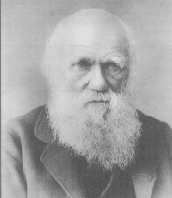 Darwin
is the first of the evolutionary biologists, the originator of the
concept of natural selection. His principal works, The Origin
of the Species by Means of Natural Selection (1859) and The
Descent of Man (1871) marked a new epoch. His works
were violently attacked and energetically defended, then; and, it
seems, yet today. Darwin
is the first of the evolutionary biologists, the originator of the
concept of natural selection. His principal works, The Origin
of the Species by Means of Natural Selection (1859) and The
Descent of Man (1871) marked a new epoch. His works
were violently attacked and energetically defended, then; and, it
seems, yet today.
The
theory as presented in Darwin's The Origin of the
Species, I should say, was not new to the world and it
cannot be attributed to Darwin. The theory, contrary to
popular belief has been around since Aristotle
and Lucretius.
Darwin's contribution is that he gathered indisputable
evidence, and he set forth a theory on how evolution works,
the theory of natural selection. Darwin:
"It may be
said that natural selection is daily and hourly scrutinising,
throughout the world, every variation, even the slightest;
rejecting that which is bad, preserving and adding up all
that is good; silently and insensibly working, whenever and
wherever opportunity offers, at the improvement of each
organic being in relation to its organic and inorganic
conditions of life. We see nothing of these slow changes in
progress, until the hand of time has marked the long lapses
of ages, and then so imperfect is our view into long past
geological ages, that we only see that the forms of life are
now different from what they formerly were." (Origin,
Chapter 4 - "Natural Selection.")
http://www.blupete.com/Literature/Biographies/Science/Darwin.htm
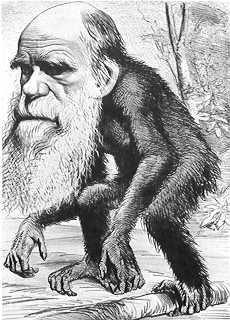 Charles
Darwin Charles
Darwin
D. I. Loizos
Charles Darwin (1809-1882) was an an English naturalist whose
theory of evolution is one of the greatest contributions ever
made to science. Darwin stated this theory in his book The
Origin of Species (1859). In another book called The
Descent of Man (1871 ) he applied his theory to the
evolution of man from a primitive monkey-like animal. Both books
aroused world-wide controversy. Many considered them to be
offensive, atheistic, blasphemous and Darwin's caricatures were
published in magazines. Although later research has modified or
disproved some of Darwin's findings, scientists still accept his
basic ideas.
http://users.hol.gr/~dilos/prehis/prerm2.htm
Charles
Robert Darwin (1809-1882)
Shino
A brief chronology.
Charles Robert Darwin was born on 12 February,1809 fifth of six
children of Robert Waring Darwin and Susannah,daughter of Josiah
Wedgwood.
In 1859,he
published,with much reluctance,the
Origin of Species which created so much havoc in
victorian society,esp.the people of divinity.
In 1882,he died on
19th April.
http://www.nobunaga.demon.co.uk/htm/darwin.htm
|




